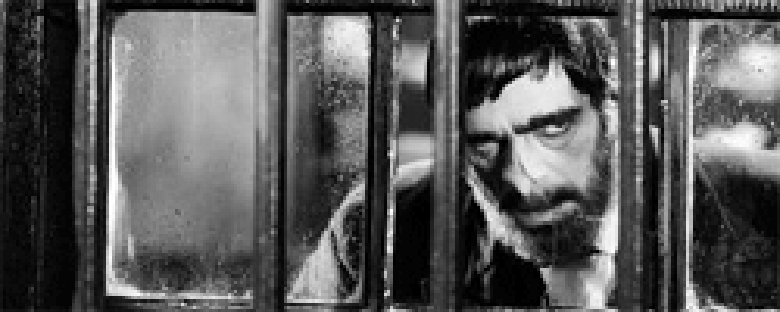Reviews
James Whale
USA, 1932
Credits
Review by Adam Balz
Posted on 01 October 2006
Source Kino Video DVD
Related articles
Features: 31 Days of Horror
Did anyone laugh?
—James Whale (Ian McKellen), Gods and Monsters
Beginning with the requisite dark and stormy night – a device still considered fresh and practical in 1932 – James Whale’s The Old Dark House builds slowly, almost sporadically, into a campy pre-war thriller. Travelers stranded in the storm-deluged Wales countryside stop and ask for shelter at a dreary castle, innocently and immediately impinging on the Femms, a family of elderly eccentrics and owners of the titular refuge. Brother Horace, a merciful milquetoast, bids them entrance while his devoutly religious and essentially deaf sister Rebecca scorns them; their silent butler Morgan offers nothing but cavernous stares and grunts, while the family patriarch, Sir Roderick, implores their understanding
Those who enjoy Frankenstein’s bleak, morally confounding meditation on humanity will find The Old Dark House a subdued disappointment. Most of the film is spent on dialogue rather than frightening visuals; where Frankenstein gave us the stomach-churning images of the little girl drowning, the Monster and the blushing bride, the Doctor and his God complex, The Old Dark House at times feels like a one-act comedy.
Yet the film is elevated above our expectations by both exceptional quality and an underlying sense of disarray. The German Expressionist influence that made Frankenstein so visually striking is retained by Arthur Edeson, who would subsequently work as cinematographer on Casablanca. The contrast of fire’s light and shadow, of Margaret Waverton’s vestal nature and white dress against Rebecca Femm’s dark wardrobe, all create a visceral display that’s at once clever and unnerving.
As in most Whale films, the actors are extraordinary; each inhabits his or her own atmosphere, and the diversity of their characters keeps the plot alive. Charles Laughton’s Sir William Porterhouse, for one, is a raving blowhard whose lack of manners offends the inhospitable Femms; his name, seemingly borne in the Hardyesque fashion of connecting namesakes to persona, denotes his rather arrogant, gluttonous personality. His companion, a vibrant yet talkative showgirl named Gladys DuCane—in reality the glowing Lillian Bond—immediately casts her spell on Roger Penderel, and the two share a rather offbeat moment in the garage. British stage actress Elspeth Dudgeon, whose film career is a succession of uncredited “Old Woman” roles, is naughtily disguised as Sir Roderick Femm. And the great Boris Karloff, once again without discernable dialogue, is outdone – a rarity in his career – by Brember Wills, who only appears on-screen in the final ten minutes. He is the film’s true monster, a raving pyromaniac and black sheep.
While the film’s detractors cite its differences from other Whale films as the primary reason for its disappointing reception and eventual neglect (it was considered lost until Curtis Harrington discovered a usable copy), some now hail it as the director’s best work. The humor is more blatant than in Frankenstein – the most memorable being Horace Femm’s insistence that William Porterhouse “have a potato” – but still possesses an underlying eeriness, exemplified by Rebecca Femm’s near poetic reminiscence late in the film:
They were all godless here. They used to bring their women here—brazen, lolling creatures in silks and satins. They filled the house with laughter and sin, laughter and sin. And if I ever went down among them, my own father and brothers – they would tell me to go away and pray, and I prayed – and left them with their lustful red and white women.
The Old Dark House, both amusing and unnatural, is a lasting testament to Whale’s career—a four-decade traipsing of tendencies and conventions embodied by the filmmaker himself. And while Frankenstein will undoubtedly stand as his crowning achievement, it’s this short, overlooked gem that created its own subgenre and a niche for those who followed.
We don’t do comments anymore, but you may contact us here or find us on Twitter or Facebook.



